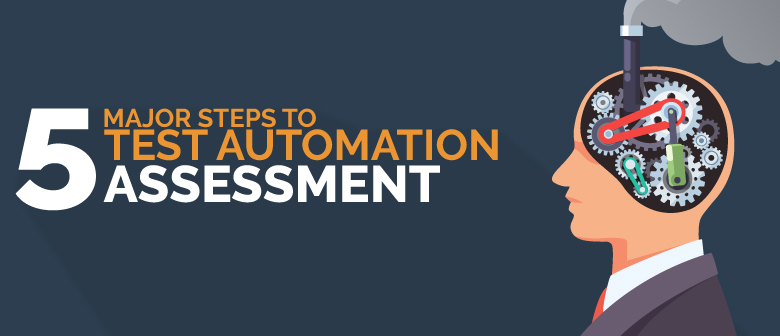Test automation is one of the most recommended testing processes during which a special software (different from the software being tested) is used to control the execution of tests as well as the comparison of actual outcomes with expected outcomes. This process executes some of the repetitive but essential testing tasks that are already in place or performs additional testing that is difficult to be performed manually.
Test automation is an effective way to improve the development process of a software product. Capable of running fast and frequently, automated tests are cost-effective and have long maintenance life. When these tests are conducted in a lively environment, it is important that these react quickly to ever-changing software systems and requirements. There is also no restriction on adding the new test cases as these can be added in parallel to the software’s development.
A number of IT and non-IT companies are already engaged in the delivery of this process. But, with the growing demand, there are a number of other companies that are solely engaged in the delivery of test automation and so are referred to as test automation companies. This article shares with you a list of seven such companies from all these sectors:
Here is the best automation testing companies in India
1. Testbytes
Testbytes is a leading software test automation company in India which provides complete testing service, including a unique approach to testing within projects, app life-cycle management consultancy, test automation, testing mobile apps etc. The enviable track record of providing test solutions and services on time has helped them to be one of the leading testing companies in India.
Testbytes mainly focuses to improve productivity and help clients to accelerate software product development or service delivery. As part of this, the company offers top end business consulting, resourcing services and implementation. Comprised with a passionate team, Testbytes is supported by dedicated center of excellence which uses latest testing tools and cutting edge technologies. Coupled with management focus, this company is a formidable combination to guarantee value to you.
2. QA Wolf
QA Wolf simplifies automating web app testing enabling 80% test coverage within four months. They provide an automated end-to-end test suite and give round-the-clock maintenance of tests. The package also provides the advantage of free unlimited parallel test runs, without any additional costs.
Key Features:
1. Unlimited Parallel Test Runs: QA Wolf allows you to run your test suite as often as necessary with no extra cost for the number of runs.
2. 24-Hour Test Maintenance: They handle your entire test suite making sure that flaky tests are managed to prevent false positives and keep pressuring you of shipping.
3. Human-Verified Bug Reports: QA Wolf also looks at the test failure in great detail to make sure it’s a real bug. Your issue tracker receives detailed bug reports that include the steps necessary to re-produce them.
4. No Vendor Lock-In: The main advantage is that it provides no vendor lock-in. You can export your tests whenever necessary.
Pros:
- Rapid and Cost-Effective: Reach high test coverage for your web app within no time with QA Wolf’s best solution.
- Expert QA Engineers: QA engineers from their team are responsible for the development and support of the automated test suite.
- Unlimited Parallel Test Runs: You can run tests whenever you please without incurring extra charges.
CI/CD Integration: Smoothly embed QA Wolf into your CI/CD workflows. - No Vendor Lock-In: You are not bound to a particular supplier; you can export your tests at any time.
Cons:
- No Native Mobile App Testing: Testing for native mobile apps is not supported by QA Wolf at the moment.

Also Read:- 12 Reasons To Invest in Software Testing!
3) Infosys
An Indian multinational company, Infosys Limited is a global leader in offering business consulting, information technology and outsourcing services in different parts of the world.
The test automation services offered by the company to its clients are not at all casual. These are executed to the client’s utmost satisfaction and help them ensure that the products and services delivered in the market surpass the expected quality standard.
Key Features:
1. Simultaneous Testing: It allows concurrent automated and manual testing, resulting in superior results.
2. Optimized for DevOps: Customized for DevOps, it combines progressive test cases with automated executions.
3. ROI Boost: It provides high efficiency and reduces initial costs with pre-made frameworks, optimized workflows, effective Standard Operating Procedures (SOPs).
4. Thorough Validation: Allows comprehensive analysis and testing of all applications resulting in increased reliability.
5. Efficient Workflow: It allows independent testing by testers, programmers and automation experts.
6. Responsive Customer Support: Offers timely and convenient customer support through emails as well as online contact forms.
Pros:
- User-Friendly Interface: The GUI interface allows non-technical users to configure and monitor test cases easily.
- Versatile Compatibility: Compatible with any industry-standard automation services.
- Speeds Up Work: Employs vigorous SOPs and prefab tools/templates hastens the processes in all stages.
Cons:
- Cost Factor for SMEs: For SMEs, it might be rather costly.
4. TCS
TCS stands out as a leading test automation company, offering an Automation-as-a-Service approach, which is a game-changer compared to traditional Software-as-a-Service models. This unique setup accelerates workflow, reducing bottlenecks at all levels. The result? Faster time to market and early detection of bugs and vulnerabilities.
TCS has been a key player in the test automation scene for over 50 years, providing robust services to clients in 50+ countries. They are pioneers in technological advancements, leading in Digital Sciences, Efficient Computing, Sustainable Futures, and more.
Key Features:
1. Technology Adoption: TCS consistently embraces new technologies to empower clients with robust automation testing capabilities.
2. AI and ML Integration: Leveraging advanced AI and ML-based automation processes, TCS enhances testing methods for superior results.
3. Robust AI Engine: Their powerful AI engine generates scripts in any language by interpreting actions and identifying objects.
4. Comprehensive Testing Services: TCS offers a range of services, including bottleneck analysis, code profiling and optimization, on-demand performance testing, and more.
Pros:
- AI, ML, and AL Algorithms: TCS employs AI, ML, and Augmented Learning algorithms to enhance product delivery quality.
- Failure Identification and Self-Healing: Capable of identifying failures and performing self-healing where possible.
- Diverse Service Portfolio: Offers services in cybersecurity, IoT, consulting, enterprise services, sustainability, and more.
Cons:
- Customer Support: Compared to competitors, customer support responsiveness may be less optimal.
4. Accenture
Accenture is a Fortune Global 500 company that deals majorly with global management consulting and professional services. Our unmatched range of services in strategy, consulting, digital, technology and operations make us capable of delivering transformational outcomes.
The testing team at Accenture assists the client companies to launch some new technology in this fast-paced world. This is owing to the testing team ability to help companies be sure of the product quality delivered by them as well as offer a seamless customer experience.
Features:
1. Specialized Testing: Easily performs special, human-driven testing in a variety of technologies.
2. Quality Control: Using a modern AI-driven and analytics approach, makes testing easier and better.
3. Modern Approach: DevOps and intelligent automation are adopted by Accenture in order to combine development testing with streamlined workflows. This forms a never ending activity where all the operations work in parallel.
4. Services Offered: Accenture offers a variety of services, such as data analytics applications service finance consulting AI marketing security automation etc.
5. End-To-End Transformation: Provides strong solutions to enable rapid alignment with contemporary Agile and DevOps practices in application development.
Pros:
- Real-Time Monitoring: Data monitoring and testing in real time, which make it easier to detect and correct results
- Automated Approach: Takes a strong automatic approach, improving testing speeds.
- Low-Code Automation: Facilitates the low-code automation for businesses with an approachable visual interface.
Cons:
- Not Ideal for DevOps Collaboration: It might not be the right pick for smooth collaboration with your DevOps processes.
5. Cigniti
Headquartered in Hyderabad, India, Cigniti Technologies is the world’s foremost company that has stepped into offering independent software testing services. With its test services offered in quality engineering, advisory & transformation, next generation testing, and core testing, the company also focuses on making use of SMART Tools that can speed up testing as well as help improve the quality of services delivered to clients.
Key Features:
1. No-Script Test Automation: It easily generates high-quality test automation that does not require expertise in scripting.
2. AI Advancements: It leverages AI to provide an adaptable framework, facilitating the ongoing change of automation artifacts in test applications.
3. Methodology: Cigniti regularly innovates and uses their own methods to automate manual tests, which can be compatible with your current agile and DevOps environment.
4. Testing Capabilities: Besides automation testing, the company offers other services such as Agile testings Test Data management ERP mappings Functional Performance and more.
Pros:
- AI Optimization: Uses a range of alternative AI algorithms, ensuring efficient test suite optimization.
- Additional Services: Provides additional services such as DevOps Transformation, Security Assurance etc.
- Custom Automation Strategy: It helps create an intricately planned automation plan matching your enterprise’s goals.
Cons:
- Limited Autonomous Management: Lacks autonomy management capacity.
Also Read:- 15 Points To Consider While Hiring a Software Testing Company
7. QualityLogic
QualityLogic is an exceptional automation testing service provider that ensures cost optimization, and tests customized to your specific needs. It is a perfect fit for cost-effective testing as it provides personalized guidance on automation strategies and ROI projections.
As a top-tier automation testing firm, QualityLogic can automatically adapt to your current software stack and align with your SDLC and processes. However, it is leading in digital accessibility and avant-garde energy testing services providing flexible arrangements for customization to your development environments.
Key Features:
1. On-Demand Assistance: QualityLogic has an experienced team of developers, testers and specialists using up-to-date technology to solve your problems.
2. Customized Approach: Assessing the scope of your technology, needs and challenges; their team creates an intelligent solution just for you.
3. Efficiency: Enables the development of extremely productive processes, ensuring that costly mistakes are identified at an early stage. It helps in lowering time to market and improving performance with bottleneck optimization.
4. Testing Services: Provides a wide range of testing services, including software testing, intelligent energy solutions, etc
Pros:
- Dedicated Support Team: It provides a separate team of support and maintenance for new feature releases.
- Comprehensive Testing Services: Offers various test services covering web automation testing, mobile app testing and others.
- Responsive Customer Support: It provides prompt customer care services via email and other modes of communication.
Cons:
- Not Ideal for Large Enterprise Projects: Not necessarily suitable for large scale enterprise level projects.
Test automation is not a task that would take a lot of time and energy. It just needs improved concentration and focus of the individual conducting it. If you are a certified professional in test automation, you can look for a career opportunity in any of the above-mentioned firms.
Frequently Asked Questions
1. How to select the best automation testing companies?
The choice of leading automation testing companies is usually dependent on factors that include industry reputation, client ratings, proficiency in automation technology and capabilities as well their ability to provide quality solutions.
2. Which various software development methodologies these companies work upon?
Many leading automation testing companies are also able to accommodate different approaches like Agile, DevOps, as well as traditional Waterfall methods. They tailor their testing approaches based on the unique requirements and operational dynamics of their customers.
3. Apart from automation testing, what kinds of test services do these companies provide?
Other than automation testing, leading companies offer broad range testing services including performance testing, security testing, mobile app testing, usability testing and specialized work in digital accessibility intelligent test.
4. Are these companies able to customize their automation solutions so that they would suit the needs of individual industries?
Yes, leading automation testing companies usually serve their clients based on individual needs of industry. They study the peculiarities and needs of various industries and customize their automation platforms aimed at quality testing in different business spheres like finances, medicine, online shops etc.









